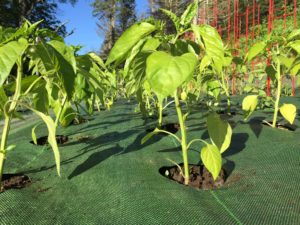
One option to keep the weeds down in both large and small spaces include GardenMats which are made in Vermont. www.GardenMats.com. Courtesy photos.
By N.R. Mallery
Many of us think a product is safe because the manufacturer says so. Monsanto says Roundup is safe, but the state of California and the European Union both specify that RoundUp is a known carcinogen. In fact, its safety cannot really be known because the records may have been tampered with. Recently, unsealed court documents suggest that Monsanto ghost wrote reports issued both by academic journals and the Environmental Protection Agency, downplaying the dangers of their products.
Roundup is, however, not alone. Many herbicides, insecticides, and fungicides turned out to be toxic to humans after manufacturers said they were safe. In the past, DDT and the notorious Agent Orange are among them.
Globally 4.5 billion tons of fertilizers are used every year. Of this, only 20% is actually taken up by the plants it is spread for. About 3.5 billion tons gets into aquifers or rivers. Two billion tons reach the oceans every year, creating over 145 dead zones bigger than the state of Rhode Island. Some of the run-off also pollutes drinking water.
Much of the food we consume has been covered with poisons. Washing it may not be enough to make it safe. Some toxins get into the cells of the food and survive cooking.
Fortunately, there are farming practices that do not depend on the poisons so commonly being put on our food. Organically-grown food costs a little more but can generally be regarded as safe. We suggest a visit to the Northeast Organic Farming Association website, http://nofavt.org to learn about many safe alternatives.

Garden mat
Green Energy Times regularly has articles on organic and sustainable farming that feature poison-free practices. For those with little space, we might suggest looking at “Indoor Salad Gardening” in our February issue, http://bit.ly/GET-indoor-salad-gardening. Also, look at the book review in this issue, on The Foodscape Revolution, on page 36.
High-quality natural fertilizers are available. One source is North Country Organics, in Bradford, Vermont. They offer a number of safe fertilizers, including one with no phosphates. Its products also include a weed control called Burnout, for a broad spectrum of weeds. It is a safe alternative for RoundUp. Learn more at http://norganics.com/.
Other options to keep the weeds down include GardenMats which are made in Vermont. www.GardenMats.com. Also, heavy mulch keeps weeds under control while providing nutrients as it decomposes. Geese are known to eat the weeds around strawberries and corn, but leave the crop alone. We do not need to put poisons on our crops.
Here are some additional links:
Ecosmart Products carries a line of weed killers and rely on food grade plant oils: ecosmart.com;
BioSafe Products, a Connecticut company, produces weed killers certified for use in organic operations (biosafesystems.com).
Horticultural-strength vinegar (10 to 20% concentration) can be found at many nurseries and hardware stores. It is natural, but it burns and will kill more than weeds, so care is needed. It should not be inhaled and can burn skin, so wear gloves and do not use it on a windy day; Brands to look for include Maestro-Gro Company, Bradfield, and Natures Wisdom.
Orange Oil, such as Nature’s Wisdom Orange Oil Concentrate, also kills weeds. This is also for spot treating, without harming the environment. It is biodegradable. Adding a half cup or so to a quart of vinegar increases the vinegar’s potency. It sticks to weeds more effectively if you also add a tablespoon of dish soap, like Dr. Bronner’s or Vermont Soap Company’s Liquid Sunshine (vermontsoap.com). Use it on a sunny day and give the sun time to work.
And there are always some handy tools that are especially good, like the CobraHead, which comes in short and long-handled versions (cobrahead.com).
We encourage you all to consider the consequences of using poisons like RoundUp and discontinue using it for the benefit of all except Montsano, who manufactures and misrepresents the dangers of this dangerous product.








Leave a Reply